Julius Caesar - Shadae M.
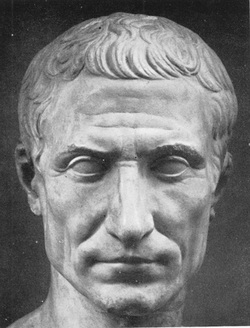
12/15/10
Throughout his lifetime, Julius Caesar accomplished many events that shaped history whether it be from dictatorship, to civil war, or to death.
There is but little record of Caesar' childhood seeing that record systems weren't he strongest asset there was in his time. His father, also named Gaius Julius Caesar had control over the area of Asia and his mother, Aurelia Cotta came from an influential, respected family. With such parents it isn't surprising how successful Caesar was. However, no man is invincible despite their political and governmental stature. In 85 BC, Gaius Julius Caesar Sr. died leaving his sixteen year old son at the head of his house. In 86 BC he was nominated to be the high priest of Jupiter. To take the position (which required him to be married) he wed Cornelia, Lucius Cinna's daughter. Rome was soon taken over by the dictator Lucius Cornelius Sulla, within his power, Rome was divided. However, though his efforts, Caesar eventually lost his priesthood, giving him the ability to reach out into the military and escape Sulla's reign.
Caesar left Rome to join the army and after doing his part in a rather important siege, he won the Civic Crown. However, when he left Rome he put up all his inheritance ad house rights. In 78 BC, Sulla died and upon hearing this, Casear ran back to Rome and took home in a lower class area. Later, in 60 BC, Caesar ran for consul. He ended up winning the election through the use of bribery and black mail. When he first came into power the aristocracy tried to limit his power in certain areas.
Later, in July of 48 BC, Caesar was named dictator. Within his reign he passed several laws such as a law which outlawed professional guilds, except those of ancient foundation, since many were subversive political clubs, a sumptuous law which restricted the purchase of certain luxuries, passed a law that rewarded families for having many children, and others. He also reformed the calendar to follow the changes of the moon cycle. After a great dispute with this he decided to replace this with the Egyptian calendar that followed the sun but added 365.25 days by inventing the leap year.
However, even through all of his triumphs, like all great men Julius Caesar was assassinated. Caesar was on his way to the Senate and while he was there he was attacked by Casca and Brutus. He attempted to get away but in failure, he fell and was stabbed twenty three times. Caesar's death brought the end of the Roman Republic. Shortly before his death, Caesar had Carthrage rebuilt and assembled a police force. Even though he was murdered, Julius had impacted the world in a very forceful way and without him the world may not be the way it is today.
Throughout his lifetime, Julius Caesar accomplished many events that shaped history whether it be from dictatorship, to civil war, or to death.
There is but little record of Caesar' childhood seeing that record systems weren't he strongest asset there was in his time. His father, also named Gaius Julius Caesar had control over the area of Asia and his mother, Aurelia Cotta came from an influential, respected family. With such parents it isn't surprising how successful Caesar was. However, no man is invincible despite their political and governmental stature. In 85 BC, Gaius Julius Caesar Sr. died leaving his sixteen year old son at the head of his house. In 86 BC he was nominated to be the high priest of Jupiter. To take the position (which required him to be married) he wed Cornelia, Lucius Cinna's daughter. Rome was soon taken over by the dictator Lucius Cornelius Sulla, within his power, Rome was divided. However, though his efforts, Caesar eventually lost his priesthood, giving him the ability to reach out into the military and escape Sulla's reign.
Caesar left Rome to join the army and after doing his part in a rather important siege, he won the Civic Crown. However, when he left Rome he put up all his inheritance ad house rights. In 78 BC, Sulla died and upon hearing this, Casear ran back to Rome and took home in a lower class area. Later, in 60 BC, Caesar ran for consul. He ended up winning the election through the use of bribery and black mail. When he first came into power the aristocracy tried to limit his power in certain areas.
Later, in July of 48 BC, Caesar was named dictator. Within his reign he passed several laws such as a law which outlawed professional guilds, except those of ancient foundation, since many were subversive political clubs, a sumptuous law which restricted the purchase of certain luxuries, passed a law that rewarded families for having many children, and others. He also reformed the calendar to follow the changes of the moon cycle. After a great dispute with this he decided to replace this with the Egyptian calendar that followed the sun but added 365.25 days by inventing the leap year.
However, even through all of his triumphs, like all great men Julius Caesar was assassinated. Caesar was on his way to the Senate and while he was there he was attacked by Casca and Brutus. He attempted to get away but in failure, he fell and was stabbed twenty three times. Caesar's death brought the end of the Roman Republic. Shortly before his death, Caesar had Carthrage rebuilt and assembled a police force. Even though he was murdered, Julius had impacted the world in a very forceful way and without him the world may not be the way it is today.
Roman Trade - Emillio M.
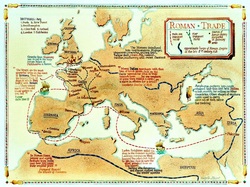
12/15/10
Rome had opened up trade routes with other countries since the foundations of the classical era that involved many different types of goods and had some effects on the Economic structure. Within the Ancient classical civilization they had commenced in trade with many different countries. This trade consisted of commercial farming, slaves, and other goods. They transported the goods mainly through private Merchant ships.
Rome did a lot of trading within it’s own countries city-states as well as in other countries outside of the Mediterranean civilization. Within their own country, they would trade grain and luxury products, such as art and craftworks. However, Rome also made trade with India and China as well. Within this trade, they found themselves at a disadvantage because of the fact that their good were less advanced and complex than that of Eastern Asian countries. Because of this, Rome mainly exported animal skins, valuable metals, and exotic African animals to Eastern Asia; in turn, Rome would receive the artistic products and spices required from China and India. The country merchants were mainly foreign and held an ambiguous social status.
Slavery was another main type of trade within classical Rome that was substantial to the economic structure. Philosophers came up with the justifications for the needs of slavery in their proper society, Aristotle being one of them. Slavery started in the final centuries of the Roman republic at a steady pace. They would mainly obtain slaves from defeated lands, therefore they used the slaves to expand their own military. Some Roman slaves also were used to perform household tasks such as tutoring the upper-class children. Rome would primarily trade slave within it’s own city-states, but mostly obtained from other territories.
These trade routes with Eastern Asia helped Rome to develop a more advanced economic structure. The Roman society gathered engineering information for technological advances. They used these advances mainly to build better roads to transport troops, but also to make trade easier. In order to maintain the grain trade, Rome had created new storage facilities to regulate their vital supplies. It also used North Africa as a granary, but the soil began to dry up and Rome was forced to move the grain trading storage facilities back to its homeland.
Due to these trades, Rome also picked up on some new cultural attributes. However, the country overall, became accustomed to different attributes because of the mountain range that divided the country in half. The art and farming techniques remained the same, but some of these differences led to Rome’s downfall. The divergence of the Roman country also held a large motivation for the rise of Christianity.
Rome had opened up trade routes with other countries since the foundations of the classical era that involved many different types of goods and had some effects on the Economic structure. Within the Ancient classical civilization they had commenced in trade with many different countries. This trade consisted of commercial farming, slaves, and other goods. They transported the goods mainly through private Merchant ships.
Rome did a lot of trading within it’s own countries city-states as well as in other countries outside of the Mediterranean civilization. Within their own country, they would trade grain and luxury products, such as art and craftworks. However, Rome also made trade with India and China as well. Within this trade, they found themselves at a disadvantage because of the fact that their good were less advanced and complex than that of Eastern Asian countries. Because of this, Rome mainly exported animal skins, valuable metals, and exotic African animals to Eastern Asia; in turn, Rome would receive the artistic products and spices required from China and India. The country merchants were mainly foreign and held an ambiguous social status.
Slavery was another main type of trade within classical Rome that was substantial to the economic structure. Philosophers came up with the justifications for the needs of slavery in their proper society, Aristotle being one of them. Slavery started in the final centuries of the Roman republic at a steady pace. They would mainly obtain slaves from defeated lands, therefore they used the slaves to expand their own military. Some Roman slaves also were used to perform household tasks such as tutoring the upper-class children. Rome would primarily trade slave within it’s own city-states, but mostly obtained from other territories.
These trade routes with Eastern Asia helped Rome to develop a more advanced economic structure. The Roman society gathered engineering information for technological advances. They used these advances mainly to build better roads to transport troops, but also to make trade easier. In order to maintain the grain trade, Rome had created new storage facilities to regulate their vital supplies. It also used North Africa as a granary, but the soil began to dry up and Rome was forced to move the grain trading storage facilities back to its homeland.
Due to these trades, Rome also picked up on some new cultural attributes. However, the country overall, became accustomed to different attributes because of the mountain range that divided the country in half. The art and farming techniques remained the same, but some of these differences led to Rome’s downfall. The divergence of the Roman country also held a large motivation for the rise of Christianity.
The Collapse of Rome - Sara A.
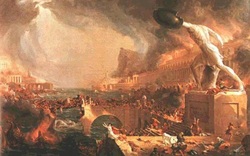
12/15/10
The great and infamous civilization of the Roman Empire flourished and prospered for an impressive amount of time. But, at around 180 C.E., Rome began to undergo changes that caused the collapse of this great European empire. The fall of the Roman Empire caused major political destruction, devastating effects on other civilizations, and greatly changed the course of the world’s history.
First, as the fall of the Roman Empire started its decline, it faced a major population decrease. This decrease was caused by a combination of bouts with plagues and the fact that the upper class citizens stopped producing children. Rome was attacked by outside forces that were taking advantage of Rome’s chaotic state. Irrevocable political disarray was also another reason why Rome fell so hard.
Second, many of the problems that the Roman Empire faced didn’t just affect Rome. During its rapid and devastating decline, there was a rapid spread of Christianity and Buddhism throughout. Trade, which decreased due to complete economical confusion, affected all of the civilizations in Rome’s trading network. Not only that, but overland travel became extremely dangerous due to the decline of the Roman Empire. The overall fall of Rome also caused the split of the Mediterranean world. Lastly, Rome’s collapse caused Western Europe to become a backwater civilization until the Renaissance period many years later.
And third, the overall direction of world history changed because of the fall of Rome. Since no new knowledge or artistic styles were being created, there wasn’t any progress in the civilization of Rome. And what made this worse was that even the levels of previous accomplishments began to decrease. There are many lessons to learn from the fall of Rome, however. Looking at today, the civilization of the West is going through many of the changes that Rome went through before its inevitable collapse.
In conclusion, the Roman Empire collapsed due to changes in its political structure, affected other areas of the world in harmful ways, and changed history forever. Since our country of America has been going through the same symptoms of the fall of Rome, it’s important that we learn from the past in order to prevent history from repeating itself.
The great and infamous civilization of the Roman Empire flourished and prospered for an impressive amount of time. But, at around 180 C.E., Rome began to undergo changes that caused the collapse of this great European empire. The fall of the Roman Empire caused major political destruction, devastating effects on other civilizations, and greatly changed the course of the world’s history.
First, as the fall of the Roman Empire started its decline, it faced a major population decrease. This decrease was caused by a combination of bouts with plagues and the fact that the upper class citizens stopped producing children. Rome was attacked by outside forces that were taking advantage of Rome’s chaotic state. Irrevocable political disarray was also another reason why Rome fell so hard.
Second, many of the problems that the Roman Empire faced didn’t just affect Rome. During its rapid and devastating decline, there was a rapid spread of Christianity and Buddhism throughout. Trade, which decreased due to complete economical confusion, affected all of the civilizations in Rome’s trading network. Not only that, but overland travel became extremely dangerous due to the decline of the Roman Empire. The overall fall of Rome also caused the split of the Mediterranean world. Lastly, Rome’s collapse caused Western Europe to become a backwater civilization until the Renaissance period many years later.
And third, the overall direction of world history changed because of the fall of Rome. Since no new knowledge or artistic styles were being created, there wasn’t any progress in the civilization of Rome. And what made this worse was that even the levels of previous accomplishments began to decrease. There are many lessons to learn from the fall of Rome, however. Looking at today, the civilization of the West is going through many of the changes that Rome went through before its inevitable collapse.
In conclusion, the Roman Empire collapsed due to changes in its political structure, affected other areas of the world in harmful ways, and changed history forever. Since our country of America has been going through the same symptoms of the fall of Rome, it’s important that we learn from the past in order to prevent history from repeating itself.
Greek and Roman Culture and Religion- Lauren G.
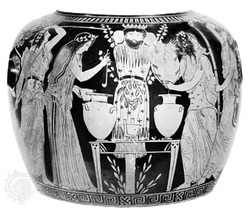
12/15/10
Greek and Roman Cultures have been idolized by many cultures for their politics and art. While Greece came first on history, Rome is much more widely known. The two cultures are very similar to each other. Classical Greek and Roman cultures had their similarities and differences especially in religion, philosophy, and art.
Neither Greece nor Rome created a world class religion. Although Christianity was later a part of Roman culture, it was not developed by the empire. Greece and Rome were both polytheistic with gods and goddesses such as the creator god known as Zeus or Jupiter and the goddess of love and beauty known as Venus. Rome had different names for their gods. The gods and goddesses made for good story telling and were told more like soap-operas on a superhuman scale. Even though the stories told of great human passion and foibles, there was a lack of spiritual passion and the religion was sometimes overridden by religions from the Middle East.
Many of the philosophers during the time of ancient Greece and Rome came from Greece. Aristotle, Greece, stressed the importance of moderation and balance in human behavior opposed to the instability of politics and excess of the gods. The Roman philosopher, Cicero, stressed points very similar to those of Aristotle. Socrates of Athens, Greece encouraged the questioning of conventional wisdom on the grounds that the human duty was improving the soul. Plato, Socrates’ great pupil, suggested that human reasoning could reach three perfect forms: True, Good, and Beautiful. The Greeks had more of an intellectual interest than Rome which was more interested in the ethics of politics.
Greece and Rome each had their own literature, visual art, and architecture. The Greeks were more interested in plays and drama where as the Romans made significant contributions to poetry and definitions of poetic form. As for visual art, Greece excelled at ceramics where Romans were better at realistic paintings. In Greece, sculptors like Phidias developed an unprecedented skill of making realistic yet beautiful sculptures from muscular warriors and athletes to beautiful goddesses. Roman sculptors were less innovative focusing on a heroic theme. The Architecture of both empires was massive and beautiful. Of course Rome adopted many Greek themes in architecture, but built larger public buildings. Greece devised the 3 column embellishments: Doric, Ionic, and Corinthian.
The cultures and religions of Classical Greece and Rome were very similar. There were few differences between the two aside from their art. Each had strong cultures that lasted them for long amounts of time.
Greek and Roman Cultures have been idolized by many cultures for their politics and art. While Greece came first on history, Rome is much more widely known. The two cultures are very similar to each other. Classical Greek and Roman cultures had their similarities and differences especially in religion, philosophy, and art.
Neither Greece nor Rome created a world class religion. Although Christianity was later a part of Roman culture, it was not developed by the empire. Greece and Rome were both polytheistic with gods and goddesses such as the creator god known as Zeus or Jupiter and the goddess of love and beauty known as Venus. Rome had different names for their gods. The gods and goddesses made for good story telling and were told more like soap-operas on a superhuman scale. Even though the stories told of great human passion and foibles, there was a lack of spiritual passion and the religion was sometimes overridden by religions from the Middle East.
Many of the philosophers during the time of ancient Greece and Rome came from Greece. Aristotle, Greece, stressed the importance of moderation and balance in human behavior opposed to the instability of politics and excess of the gods. The Roman philosopher, Cicero, stressed points very similar to those of Aristotle. Socrates of Athens, Greece encouraged the questioning of conventional wisdom on the grounds that the human duty was improving the soul. Plato, Socrates’ great pupil, suggested that human reasoning could reach three perfect forms: True, Good, and Beautiful. The Greeks had more of an intellectual interest than Rome which was more interested in the ethics of politics.
Greece and Rome each had their own literature, visual art, and architecture. The Greeks were more interested in plays and drama where as the Romans made significant contributions to poetry and definitions of poetic form. As for visual art, Greece excelled at ceramics where Romans were better at realistic paintings. In Greece, sculptors like Phidias developed an unprecedented skill of making realistic yet beautiful sculptures from muscular warriors and athletes to beautiful goddesses. Roman sculptors were less innovative focusing on a heroic theme. The Architecture of both empires was massive and beautiful. Of course Rome adopted many Greek themes in architecture, but built larger public buildings. Greece devised the 3 column embellishments: Doric, Ionic, and Corinthian.
The cultures and religions of Classical Greece and Rome were very similar. There were few differences between the two aside from their art. Each had strong cultures that lasted them for long amounts of time.
Political Institutions in Rome - Amanda A.
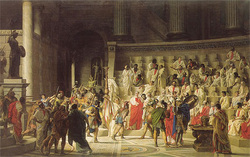
12/15/10
The Roman Empire placed a great deal of importance in their political institutions. Rome took from Greek elements of political institutions, especially the idea of rule by the aristocracy. Rome introduced new ideas in their political institutions, created a trend of having several different political theories, and affected the history by creating ideas that future empires in west Europe would use.
The Romans took many ideas that the Greek city-states had, but introduced some of their new ideas as well. Both Greece and Rome relied on the rule of the aristocracy; the people they thought were the best. Rome created the Senate, which was the most important legislative body. It was composed mainly of aristocrats, and they held just about all of the executive offices in Rome. There were two consuls, who shared primary executive power. In times of crisis, the Senate could elect a dictator to make the emergency decisions. Fair, reasoned law codes were important in keeping the diverse empire together.
The political institutions created during the Roman Empire created a trend in the history of Western Europe. There were many different political theories, which created diverse political systems. The emphasis that the Romans put on the military to create and expand huge empires was something that west Europe would use even after the fall of the Roman Empire. The legacy of the Roman Empire’s political institutions was intense loyalty to the state, localism, and the importance of uniform laws.
The ideas and theories about the political organization of the Roman Empire affected the history of the world. It especially affected the history of Western Europe. During the eighteenth century Enlightenment, philosophers in Western Europe looked back and took from Greek and Roman political theories on who should rule and how the government should best be organized. The United States of America would also take from the ideas of Rome and Greece to create and organize the government.
The political theories created during the Roman Empire introduced new ideas, created a trend with the many diverse theories, and affected history by creating ideas that future empires would use. The political institutions of the Roman Empire are especially important to America today because many of our political institutions are based off of Roman ones. The richness of the political culture of the Romans was very important to the world.
The Roman Empire placed a great deal of importance in their political institutions. Rome took from Greek elements of political institutions, especially the idea of rule by the aristocracy. Rome introduced new ideas in their political institutions, created a trend of having several different political theories, and affected the history by creating ideas that future empires in west Europe would use.
The Romans took many ideas that the Greek city-states had, but introduced some of their new ideas as well. Both Greece and Rome relied on the rule of the aristocracy; the people they thought were the best. Rome created the Senate, which was the most important legislative body. It was composed mainly of aristocrats, and they held just about all of the executive offices in Rome. There were two consuls, who shared primary executive power. In times of crisis, the Senate could elect a dictator to make the emergency decisions. Fair, reasoned law codes were important in keeping the diverse empire together.
The political institutions created during the Roman Empire created a trend in the history of Western Europe. There were many different political theories, which created diverse political systems. The emphasis that the Romans put on the military to create and expand huge empires was something that west Europe would use even after the fall of the Roman Empire. The legacy of the Roman Empire’s political institutions was intense loyalty to the state, localism, and the importance of uniform laws.
The ideas and theories about the political organization of the Roman Empire affected the history of the world. It especially affected the history of Western Europe. During the eighteenth century Enlightenment, philosophers in Western Europe looked back and took from Greek and Roman political theories on who should rule and how the government should best be organized. The United States of America would also take from the ideas of Rome and Greece to create and organize the government.
The political theories created during the Roman Empire introduced new ideas, created a trend with the many diverse theories, and affected history by creating ideas that future empires would use. The political institutions of the Roman Empire are especially important to America today because many of our political institutions are based off of Roman ones. The richness of the political culture of the Romans was very important to the world.
Augustus Caesar - David A.
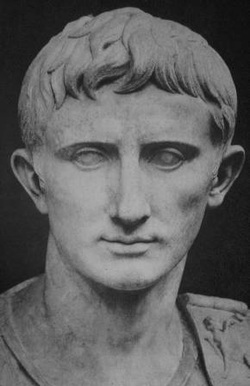
12/15/10
Born Gaius Octavius in 63 BC, this man would later become the very first Roman Emperor and the man responsible for 200 years of “Pax Romana”, or Roman peace. His greatest asset in life was his connections with Julius Caesar whom his mother was a niece of. Through this and by making a great impression on Julius during a campaign in Spain Octavius successfully became the sole heir of the vast fortune that Julius spent a lifetime creating. Upon hearing the news of his great-uncle's assassination on the Ides of March Augustus formed a second triumvirate to destroy the conspirators who plotted Julius's assassination.
This second triumvirate, which composed of Octavius, Marc Antony and Marcus Lepidus, would end up with similar results to the previous triumvirate made by Julius Caesar himself. After the defeat of the assassins army in 42 B.C.E. there was a short lived peace as Antony married Octavius's sister to further strengthen their alliance. Things quickly soured, however, when Antony had an affair with Cleopatra of Egypt. This was seen as an insult to Octavius and, after further solidifying his power in Rome, he waged war upon Antony and Cleopatra and successfully defeated their armies in 31 B.C.E . Shortly after his victory Octavius turned towards Marcus Lepidus and used charges of rebellion to exile him ensuring that complete and total power lied with him.
Despite his immense power Octavius was well aware that openly continuing any plans of becoming dictator could spark another civil war and further antagonize the republic. In a move of incredible foresight Octavius returned full power to the Roman Senate and relinquished all control of the Roman provinces and their military. In exchange the senate named him “Augustus” (one who is marked with greatness and dignity) and gave him the powers of Roman tribune, censor and consul, three offices which had never been granted to a single person before. These new powers allowed him to personally oversee Rome's finances, bring forth new legislation to the senate and the ability to veto proposals made by the senate. Although technically all permanent legal power in Rome still lied with the senate this was mostly a legal fiction as Augustus controlled the Roman Senate and could easily rely on the support of many soldiers who were still loyal to him. Augustus ultimately decided to continue the facade that the senate still had any power by calling himself a “Princeps” or “First Citizen” rather than the title of Emperor.
Rome under Augustus would become some of the greatest years in Western history. During the four decades he was emperor Augustus would finance a number of building projects including a new senate house and a temple to Apollo and “Divine Julius”, his famous great-uncle. Art and culture flourished as a number of poets and authors such as Virgil and Horace published their greatest works. The ending of civil strife also meant that, to the great relief of many soldiers, Rome's Legions could start focusing on fighting external foes. Roman borders extended to Danube, Spain was conquered and only two military defeats were suffered, none of which had any permanent effect. Augustus was so successful that even after his passing in 14 C.E. a return to the old system was almost unthinkable and he was peacefully succeeded by Tiberius.
Augustus had once boasted that he had “found Rome a city of brick and left it marble”, a statement that was greatly justified. Augustus had accomplished what he had set out to do and brought great stability and power to the Roman Empire that would last 200 years. Through both military might and political genius he managed to appease those who were fearful of an autocrat while still effectively being one. It was on his death bed that Augustus Caesar supposedly said the words that accurately describes his rule as unofficial emperor, “If I have played my part well, clap your hands, and dismiss me with applause from the stage.”
Born Gaius Octavius in 63 BC, this man would later become the very first Roman Emperor and the man responsible for 200 years of “Pax Romana”, or Roman peace. His greatest asset in life was his connections with Julius Caesar whom his mother was a niece of. Through this and by making a great impression on Julius during a campaign in Spain Octavius successfully became the sole heir of the vast fortune that Julius spent a lifetime creating. Upon hearing the news of his great-uncle's assassination on the Ides of March Augustus formed a second triumvirate to destroy the conspirators who plotted Julius's assassination.
This second triumvirate, which composed of Octavius, Marc Antony and Marcus Lepidus, would end up with similar results to the previous triumvirate made by Julius Caesar himself. After the defeat of the assassins army in 42 B.C.E. there was a short lived peace as Antony married Octavius's sister to further strengthen their alliance. Things quickly soured, however, when Antony had an affair with Cleopatra of Egypt. This was seen as an insult to Octavius and, after further solidifying his power in Rome, he waged war upon Antony and Cleopatra and successfully defeated their armies in 31 B.C.E . Shortly after his victory Octavius turned towards Marcus Lepidus and used charges of rebellion to exile him ensuring that complete and total power lied with him.
Despite his immense power Octavius was well aware that openly continuing any plans of becoming dictator could spark another civil war and further antagonize the republic. In a move of incredible foresight Octavius returned full power to the Roman Senate and relinquished all control of the Roman provinces and their military. In exchange the senate named him “Augustus” (one who is marked with greatness and dignity) and gave him the powers of Roman tribune, censor and consul, three offices which had never been granted to a single person before. These new powers allowed him to personally oversee Rome's finances, bring forth new legislation to the senate and the ability to veto proposals made by the senate. Although technically all permanent legal power in Rome still lied with the senate this was mostly a legal fiction as Augustus controlled the Roman Senate and could easily rely on the support of many soldiers who were still loyal to him. Augustus ultimately decided to continue the facade that the senate still had any power by calling himself a “Princeps” or “First Citizen” rather than the title of Emperor.
Rome under Augustus would become some of the greatest years in Western history. During the four decades he was emperor Augustus would finance a number of building projects including a new senate house and a temple to Apollo and “Divine Julius”, his famous great-uncle. Art and culture flourished as a number of poets and authors such as Virgil and Horace published their greatest works. The ending of civil strife also meant that, to the great relief of many soldiers, Rome's Legions could start focusing on fighting external foes. Roman borders extended to Danube, Spain was conquered and only two military defeats were suffered, none of which had any permanent effect. Augustus was so successful that even after his passing in 14 C.E. a return to the old system was almost unthinkable and he was peacefully succeeded by Tiberius.
Augustus had once boasted that he had “found Rome a city of brick and left it marble”, a statement that was greatly justified. Augustus had accomplished what he had set out to do and brought great stability and power to the Roman Empire that would last 200 years. Through both military might and political genius he managed to appease those who were fearful of an autocrat while still effectively being one. It was on his death bed that Augustus Caesar supposedly said the words that accurately describes his rule as unofficial emperor, “If I have played my part well, clap your hands, and dismiss me with applause from the stage.”
Introduction of Christianity to Rome - Aliya S.
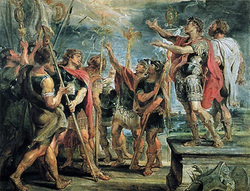
12/15/10
From it's beginnings, the Romans worshiped their own gods and goddesses. Venus, Mars, and Pluto were all gods who were created by the Romans, not from any central belief, but as a mixture of different rituals, taboos, superstitions and traditions which they had gathered over the years. To the Romans, religion was less a spiritual experience than a contractual relationship between mankind and the forces which were believed to control people's existence and well-being. But, later on, Christianity rose up in power, and eventually they let go of their own religion and made room for Christianity as their main religion of state. But, they had a long period before they converted, in which they resisted the new religion and event went as far as killing Christians. However, the lives of the Roman citizens would be changed, once this religion was introduced. When Christianity was introduced, life, law, and politics were all changed in Roman society.
Many new laws were put into place in AD 313 by the emperor, Constantine, most of them granting in favor of the Christians. Money was granted to clergys to build churches and several large monuments, which cut large whole in the countries' economy. Law decreed that the Pagan churches were to have all their treasure contained, and it was taken and given to that of the Christian churches instead, and that their churches, if seen that they were wrong were razed and deemed as forbidden. Religions were suppressed, laws granted money to churches, and the bias within office was made obvious as the laws and decrees grew and grew in favor of the Christians.
People's beliefs were torn apart and where then forced to believe into this new religion that had been shoved to them. They had to disregard their previous pagan religion and all of their previous beliefs, and worship that of God, unless they wanted to be killed. Sexuality was suppressed as well. Many back in that time were openly homosexual, however that of the Christian faith said that a man with another man is wrong, and therefore anyone who was known as being a homosexual was killed. But people wouldn't not just stand back and take this, and in retaliation, the would formed Arianism, which questioned the belief system of the chruch. But they were still suppressed under the the rule of Constantine, who continued to push Christianity during his time on the throne.
As Christianity rose, so did the positions of those who believed in the faith. Their status, both politically and socially, rose greatly as Constantine favored them more. They gained wealth, and contributed to the law making of the land as well, creating a bias in law, leaning more towards the faith of Christianity. This bias granted them more options to build churches and other monuments in the name of God, as they tore down other churches. Several Chistians also took control in military, granting Constantine more and more power, as he continued to shower Christians with money and treasure and suppressed pagan religions. It was impossible to throw Constantine out of power as he gained more followers into office and under his control, so long as he gave the Christians money and churches, he could maintain control. Even as Julian gained the throne years later, he did little to change the workings of the political system, which turned it corrupt.
It's clear that the introduction of Christianity to the Empire shifted a lot of things. It might of even been a large cause in the fall of Rome because of the controversy and diversity it caused between the people. Either way, it's introduction was dramatic, and caused many problems within politics and lifestyle in which the people of the empire has previously lived. Such a culture shock was hard and strenuous in the country, which caused several problems later down the road.
From it's beginnings, the Romans worshiped their own gods and goddesses. Venus, Mars, and Pluto were all gods who were created by the Romans, not from any central belief, but as a mixture of different rituals, taboos, superstitions and traditions which they had gathered over the years. To the Romans, religion was less a spiritual experience than a contractual relationship between mankind and the forces which were believed to control people's existence and well-being. But, later on, Christianity rose up in power, and eventually they let go of their own religion and made room for Christianity as their main religion of state. But, they had a long period before they converted, in which they resisted the new religion and event went as far as killing Christians. However, the lives of the Roman citizens would be changed, once this religion was introduced. When Christianity was introduced, life, law, and politics were all changed in Roman society.
Many new laws were put into place in AD 313 by the emperor, Constantine, most of them granting in favor of the Christians. Money was granted to clergys to build churches and several large monuments, which cut large whole in the countries' economy. Law decreed that the Pagan churches were to have all their treasure contained, and it was taken and given to that of the Christian churches instead, and that their churches, if seen that they were wrong were razed and deemed as forbidden. Religions were suppressed, laws granted money to churches, and the bias within office was made obvious as the laws and decrees grew and grew in favor of the Christians.
People's beliefs were torn apart and where then forced to believe into this new religion that had been shoved to them. They had to disregard their previous pagan religion and all of their previous beliefs, and worship that of God, unless they wanted to be killed. Sexuality was suppressed as well. Many back in that time were openly homosexual, however that of the Christian faith said that a man with another man is wrong, and therefore anyone who was known as being a homosexual was killed. But people wouldn't not just stand back and take this, and in retaliation, the would formed Arianism, which questioned the belief system of the chruch. But they were still suppressed under the the rule of Constantine, who continued to push Christianity during his time on the throne.
As Christianity rose, so did the positions of those who believed in the faith. Their status, both politically and socially, rose greatly as Constantine favored them more. They gained wealth, and contributed to the law making of the land as well, creating a bias in law, leaning more towards the faith of Christianity. This bias granted them more options to build churches and other monuments in the name of God, as they tore down other churches. Several Chistians also took control in military, granting Constantine more and more power, as he continued to shower Christians with money and treasure and suppressed pagan religions. It was impossible to throw Constantine out of power as he gained more followers into office and under his control, so long as he gave the Christians money and churches, he could maintain control. Even as Julian gained the throne years later, he did little to change the workings of the political system, which turned it corrupt.
It's clear that the introduction of Christianity to the Empire shifted a lot of things. It might of even been a large cause in the fall of Rome because of the controversy and diversity it caused between the people. Either way, it's introduction was dramatic, and caused many problems within politics and lifestyle in which the people of the empire has previously lived. Such a culture shock was hard and strenuous in the country, which caused several problems later down the road.
Roman Expansion - Jessika L.
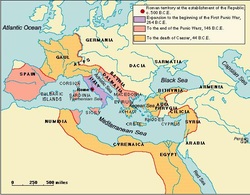
12/15/10
Roman conquests were swift and concise. However, it left their borders weak and crippled as the newly acquired territories revolted. Their military played a huge part in their expansion and collapse. Roman expansion was largely based on their sheer power and size, and they had many motives for conquering new lands, but when it came down to maintaining control of regions, it backfired and was a contributing factor towards their collapse.
Rome came from very small roots as a monarchy in Italy around 800 B.C.E. After the destruction of the monarchy, Roman aristocrats set up a complex system of political institutions and Rome gradually became stronger around Italy. They succeeded in seizing some of the Greek provinces in the south. So began their widespread conquests. Rome overpowered Carthage in one of the Punic Wars (264 - 146 B.C.E.) and managed to destroy the Phoenician city and later rebuild it. Afterwards, Rome had a fairly easy task of seizing the rest of the western Mediterranean, Greece, and Egypt. This vast, widespread and dynamic expansion would later prove to be a fatal flaw in Roman military strategy.
The Ancient Romans had various reasons for expanding their territory. It is obvious that religious zeal was not what drove the Romans to invade other provinces because they were mainly a polytheistic religion up until the time of their decline. It could be argued that monetary gain was a major incentive for expansion. With new lands came new trade routes to the East. It was vital to the Romans to have control of these routes because they fueled their economy. Evidence of this is in their roads. Trade was essential to Roman life. Power was another major source for the desire of dominance in all of the international aspects. Emperors were driven by greed, corruption, and wealth behind conquering new lands. One of the major motives behind people committing to often infamous or notorious acts was to have their legacies carried on. In the ancient world, it was the only way to live on and be forever remembered as a noble, strong, and courageous person, something all of the leaders strived for. However you look at the motives behind Roman expansion, it is clear that greed, corruption, and instability within the borders led to instability around the borders.
It is evident that one of the major reasons for the decline and ultimate collapse of the Roman Empire was the expansion that gained them a lot of land. Through being too involved in expansion, they forgot about political turmoil inside the state, particularly with the lower classes. Revolts brought down Rome from the inside. Another cause was that they spread their military too thin trying to secure the trade routes and newly acquired borders. The borders were already unstable because most of the earlier occupants wanted no part in the Roman Empire. It could be said that Rome caved in on itself like a house of cards. As they tried to add more cards, the weaker the state became.
Roman expansion was effective to a certain degree. When they became power hungry and greedy, the state began to fold in upon itself. Its power and size brought it down.
Roman conquests were swift and concise. However, it left their borders weak and crippled as the newly acquired territories revolted. Their military played a huge part in their expansion and collapse. Roman expansion was largely based on their sheer power and size, and they had many motives for conquering new lands, but when it came down to maintaining control of regions, it backfired and was a contributing factor towards their collapse.
Rome came from very small roots as a monarchy in Italy around 800 B.C.E. After the destruction of the monarchy, Roman aristocrats set up a complex system of political institutions and Rome gradually became stronger around Italy. They succeeded in seizing some of the Greek provinces in the south. So began their widespread conquests. Rome overpowered Carthage in one of the Punic Wars (264 - 146 B.C.E.) and managed to destroy the Phoenician city and later rebuild it. Afterwards, Rome had a fairly easy task of seizing the rest of the western Mediterranean, Greece, and Egypt. This vast, widespread and dynamic expansion would later prove to be a fatal flaw in Roman military strategy.
The Ancient Romans had various reasons for expanding their territory. It is obvious that religious zeal was not what drove the Romans to invade other provinces because they were mainly a polytheistic religion up until the time of their decline. It could be argued that monetary gain was a major incentive for expansion. With new lands came new trade routes to the East. It was vital to the Romans to have control of these routes because they fueled their economy. Evidence of this is in their roads. Trade was essential to Roman life. Power was another major source for the desire of dominance in all of the international aspects. Emperors were driven by greed, corruption, and wealth behind conquering new lands. One of the major motives behind people committing to often infamous or notorious acts was to have their legacies carried on. In the ancient world, it was the only way to live on and be forever remembered as a noble, strong, and courageous person, something all of the leaders strived for. However you look at the motives behind Roman expansion, it is clear that greed, corruption, and instability within the borders led to instability around the borders.
It is evident that one of the major reasons for the decline and ultimate collapse of the Roman Empire was the expansion that gained them a lot of land. Through being too involved in expansion, they forgot about political turmoil inside the state, particularly with the lower classes. Revolts brought down Rome from the inside. Another cause was that they spread their military too thin trying to secure the trade routes and newly acquired borders. The borders were already unstable because most of the earlier occupants wanted no part in the Roman Empire. It could be said that Rome caved in on itself like a house of cards. As they tried to add more cards, the weaker the state became.
Roman expansion was effective to a certain degree. When they became power hungry and greedy, the state began to fold in upon itself. Its power and size brought it down.
